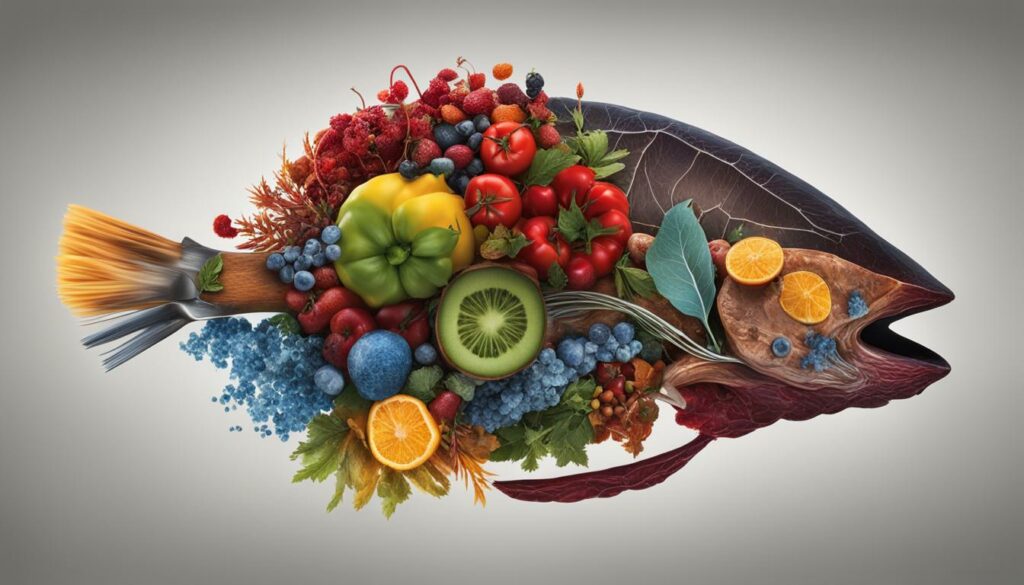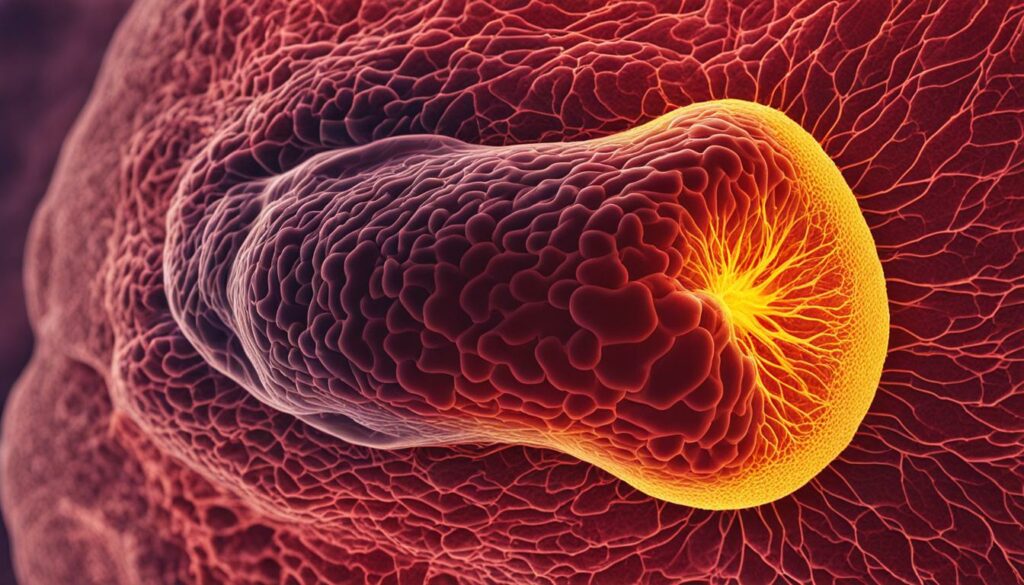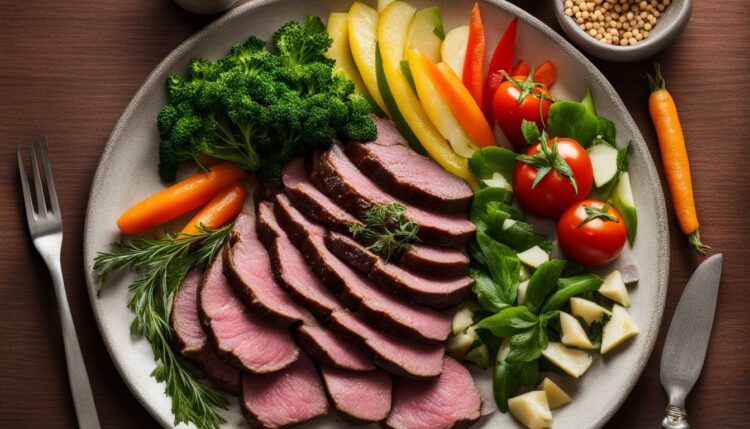Did you know that liver is one of the most nutrient-dense foods available?
Despite its unique flavor and texture, liver offers numerous health benefits and can support various bodily functions. Its rich protein content, along with vitamins, minerals, and essential nutrients, makes liver a powerhouse of nutrition.
Key Takeaways:
- Liver is a highly nutrient-dense food.
- It is rich in protein, vitamins, minerals, and essential nutrients.
- Liver supports the immune system, tissue repair, and energy production.
- Different types of liver have similar nutritional profiles.
- While liver is beneficial, it should be consumed in moderation.
The Nutritional Profile of Liver
Liver is often hailed as a nutritional powerhouse due to its impressive array of essential nutrients. It is packed with vitamins, minerals, and other beneficial compounds that contribute to overall health and well-being.
Let’s take a closer look at the nutritional value of liver:
Vitamins in Liver
Liver is a rich source of various vitamins. One of the standout nutrients found in liver is vitamin A, which plays a crucial role in maintaining healthy vision, supporting immune function, and promoting proper cell growth and development.
Vitamin B12 is another vital nutrient in liver, necessary for red blood cell production and maintaining the health of the nervous system. Riboflavin, folate, and other B vitamins are also present in significant amounts, supporting energy production and metabolism.
Minerals in Liver
The mineral profile of liver is equally impressive. Iron, an essential mineral for carrying oxygen in the blood, is found abundantly in liver. This makes it an excellent food choice for individuals who are at risk of iron deficiency or anemia.
Copper, another mineral found in liver, aids in the production of red blood cells and collagen synthesis, supporting the health of connective tissues. Additionally, liver contains choline, an essential nutrient that plays a role in brain development and function.
All these vitamins and minerals work in harmony to support various bodily functions, such as immune function, energy production, tissue repair, and maintenance of proper cognitive function.
Liver is truly a nutritional powerhouse, offering a diverse range of vitamins and minerals that are crucial for the body’s optimal functioning.
By incorporating liver into your diet, you can easily boost your nutrient intake and reap the benefits of these essential compounds.
| Nutrient | Amount per 100g of Liver |
|---|---|
| Vitamin A | 16,000 IU |
| Vitamin B12 | 60.9 mcg |
| Riboflavin | 2.41 mg |
| Folate | 290 mcg |
| Iron | 6.5 mg |
| Copper | 12.0 mg |
| Choline | 418 mg |
| Protein | 20.4 g |
As shown in the table above, liver is an excellent source of vitamins, minerals, and high-quality protein. Including this nutrient-dense organ meat in your diet can help you meet your daily nutrient requirements and support overall health and well-being.
Health Benefits of Liver
Consuming liver can provide numerous health benefits. It supports the immune system, helps with tissue repair and growth, and contributes to energy production.
The vitamins and minerals found in liver have been linked to improved bone health, enhanced brain function, and improved mood. Liver is also a great source of iron, which can help prevent and treat anemia.
In fact, liver plays a crucial role in immune system support. It contains high levels of vitamin A, a nutrient known for its immune-enhancing properties.
Vitamin A helps maintain the integrity of skin and mucous membranes, which are vital in preventing infections. It also supports the production of white blood cells, which are essential for fighting off harmful pathogens.
Additionally, liver is rich in nutrients that support tissue repair and growth. The high protein content of liver provides the building blocks for repairing damaged tissues and promoting growth in muscles, organs, and other bodily structures.
Moreover, liver is a great source of vitamins and minerals that contribute to energy production. B vitamins, such as riboflavin and folate, are involved in the conversion of carbohydrates, fats, and proteins into energy. They help optimize metabolism and ensure efficient energy production in the body.

Furthermore, liver is a nutrient powerhouse that supports overall health and well-being. It contains essential nutrients like vitamin B12, which is important for nerve function and the formation of red blood cells.
The high iron content of liver can help prevent and treat anemia, a condition characterized by low red blood cell count and reduced oxygen-carrying capacity.
Liver is a true superfood when it comes to supporting the immune system, promoting tissue repair, and aiding in energy production. Its abundance of vitamins, minerals, and essential nutrients make it a valuable addition to a balanced diet.
Nutritional Comparison of Different Types of Liver
When it comes to liver nutrition, different types offer slightly different profiles. Whether you prefer beef, calf, pork, lamb, chicken, goose, or cod liver, you can find a wide array of essential nutrients in each variety. Despite their slight variations, all types of liver are highly nutritious and provide similar health benefits.
Liver is an excellent source of protein, vitamins, and minerals, making it a valuable addition to a well-balanced diet. Let’s take a closer look at the nutritional profiles of different types of liver:
| Liver Type | Nutritional Highlights |
|---|---|
| Beef Liver | High in protein, vitamin A, iron, and zinc |
| Calf Liver | Rich in protein, vitamin B12, and selenium |
| Pork Liver | Contains protein, vitamin D, vitamin E, and potassium |
| Lamb Liver | Good source of protein, vitamins B2 and B5, and copper |
| Chicken Liver | High in protein, vitamins B6 and B9, and niacin |
| Goose Liver | Provides protein, vitamin K, and phosphorus |
| Cod Liver | Rich in protein, omega-3 fatty acids, and vitamin D |
As you can see, every type of liver has its own unique nutritional highlights, which may appeal to individuals with specific dietary needs or preferences. However, regardless of the specific type, liver is an excellent source of essential nutrients that can support overall health and well-being.
Remember, when incorporating liver into your diet, it’s important to consume it in moderation and as part of a balanced eating plan. Consult with a healthcare professional or registered dietitian for personalized guidance and recommendations.
References:
- Reference 1
- Reference 2
- Reference 3
Potential Drawbacks of Eating Liver
While liver provides numerous health benefits, it’s important to be aware of potential drawbacks associated with its consumption. It’s high in cholesterol, which may pose a risk for individuals with certain health conditions.
Ingesting excessive amounts of vitamin A or copper from liver can lead to toxicity. It’s also worth noting that liver may contain antibiotics, which can contribute to antibiotic resistance in humans.
Despite these potential drawbacks, it’s worth mentioning that the overall nutritional value and health benefits of liver still make it a valuable addition to a balanced diet. The key is to consume liver in moderation and be mindful of these factors, especially if you have specific health concerns.
“While liver provides numerous health benefits, it’s important to be aware of potential drawbacks associated with its consumption.”
High Cholesterol in Liver
One potential drawback of eating liver is its high cholesterol content. While cholesterol is an essential nutrient needed by the body, consuming excessive amounts can negatively impact heart health, especially for individuals with conditions such as high blood pressure or cardiovascular disease.
Vitamin A Toxicity
Vitamin A toxicity can occur when consuming too much liver, as it is a rich source of this particular vitamin. Excessive intake of vitamin A can lead to symptoms such as nausea, dizziness, and even more severe complications in extreme cases. It’s important to maintain a balanced intake of vitamin A from a variety of food sources.
Copper Toxicity
Liver is also high in copper, an essential trace mineral. While copper is necessary for various bodily functions, excessive intake can lead to copper toxicity. Symptoms include gastrointestinal discomfort, liver damage, and even neurological issues. It’s crucial to balance copper intake to avoid potential complications.
Antibiotics in Liver
Liver may contain antibiotics, which can be a concern in terms of antibiotic resistance. Widespread use of antibiotics in livestock farming can contribute to the development of antibiotic-resistant bacteria, which poses a significant threat to public health. Choosing organic or antibiotic-free liver can help reduce exposure to antibiotics.

Who Should Be Cautious When Consuming Liver
Pregnant women and individuals with gout should exercise caution when including liver in their diets. While liver is a nutrient-rich food, certain considerations must be taken into account for these specific groups.
Risks for Pregnant Women
Pregnant women should be mindful of their liver consumption due to the high vitamin A content found in this organ meat. Excessive intake of vitamin A during pregnancy can lead to birth defects and other complications.
It is recommended that pregnant women consult with their healthcare provider to ensure they are consuming liver in safe amounts that align with their specific nutritional needs.
Gout and Liver Consumption
People with gout should also approach liver consumption with caution. Liver contains high levels of purines, which are chemical compounds that can contribute to the production of uric acid in the body. Excessive uric acid can trigger gout flare-ups and worsen symptoms.
Individuals with gout are advised to limit their liver intake and consider alternative protein sources that are lower in purines. Consulting with a healthcare professional or registered dietitian can help develop a personalized dietary plan that minimizes gout-related risks.
| Potential Risks | Recommendations |
|---|---|
| Vitamin A toxicity | Consult with a healthcare provider to determine safe levels of liver consumption during pregnancy. |
| Gout flare-ups | Limit liver consumption and explore lower purine protein sources under the guidance of a healthcare professional or registered dietitian. |
It’s important for pregnant women and individuals with gout to prioritize their overall health and work closely with healthcare professionals to make informed decisions about their diet. With proper guidance, liver can still be enjoyed in a balanced way that aligns with their specific health needs.
Conclusion
Liver is a highly nutritious food with a wide range of health benefits. Packed with essential nutrients, vitamins, and minerals, liver supports various bodily functions, making it a valuable addition to your meals. However, it is crucial to consume liver in moderation and as part of a balanced diet.
Including liver as part of your balanced diet can provide numerous benefits. It is rich in protein, iron, and vitamins A, B12, and folate, which are essential for immune function, energy production, tissue repair, and overall well-being.
Moreover, liver has been linked to improved bone health, enhanced brain function, and a positive mood.
While liver offers significant benefits, it is important to be mindful of potential risks. Liver is high in cholesterol, so individuals with certain health conditions should exercise caution. Additionally, consuming excessive amounts of vitamin A or copper from liver can lead to toxicity.
If you have any concerns or specific health conditions, it is advisable to consult with a healthcare professional to ensure safe liver consumption.
Incorporating liver into your diet can be a smart choice to reap its many benefits. However, remember that moderation is key.
Aim for a well-balanced diet that includes a variety of nutrient-dense foods, such as fruits, vegetables, whole grains, lean proteins, and healthy fats. By doing so, you can enjoy the advantages of liver while maintaining a healthy and sustainable eating pattern.
FAQ
Is liver good for you?
Yes, liver is a nutrient-dense food that offers numerous health benefits. It is packed with essential nutrients, vitamins, and minerals that support various bodily functions.
What is the nutritional profile of liver?
Liver is rich in protein, vitamins (including vitamin A, vitamin B12, riboflavin, and folate), minerals (such as iron and copper), and choline. These nutrients play vital roles in immune function, energy production, and tissue repair.
What are the health benefits of liver?
Consuming liver can support the immune system, help with tissue repair and growth, and contribute to energy production. The vitamins and minerals found in liver have been linked to improved bone health, enhanced brain function, and improved mood.
How does the nutritional value of different types of liver compare?
Different types of liver, such as beef, calf, pork, lamb, chicken, goose, and cod liver, have slightly different nutritional profiles. However, all types of liver are excellent sources of protein, vitamins, and minerals.
Are there any potential drawbacks to eating liver?
Liver is high in cholesterol and can contain antibiotics, which may pose risks for certain individuals. Ingesting too much vitamin A or copper from liver can lead to toxicity.
Who should be cautious when consuming liver?
Pregnant women should be cautious due to the high vitamin A content in liver, which can be harmful in large amounts. People with gout should also limit their consumption of liver due to its purine content, which can contribute to gout flare-ups.
What should I keep in mind when including liver in my diet?
Liver is a highly nutritious food that should be consumed in moderation as part of a balanced diet. It is important to be mindful of potential risks and consult with a healthcare professional if necessary.




